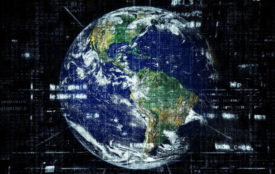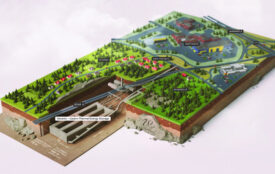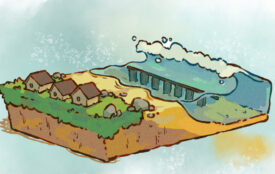Scientists and politicians worked together to solve the global warming crisis
In 1988, scientists and politicians worked closely together to develop the Montreal Protocol on Substances that Deplete the Ozone Layer, the first universally ratified treaty in United Nations history.
Little did they realize that this same treaty would bring an end to global warming ten years later.
Chlorofluorocarbon gases (CFCs) were manufactured in the 1960s for use as spray-can propellants, refrigerants, solvents, and fire retardants. CFCs are very inert; they do not react chemically with most substances. As CFC emissions rose in the late 1960s, the ozone layer in the lower stratosphere began to be depleted and global surface temperatures began to rise.
In 1974, two American scientists, Mario Molina and Sherwood Rowland, showed that CFCs could be broken down by solar ultraviolet radiation in the lower stratosphere, releasing chlorine atoms that destroy ozone. In 1985, three British scientists, Joe Farman, Brian Gardiner, and Jonathan Shanklin, found that ozone over Antarctica was severely depleted, forming the Antarctic Ozone Hole.
The ozone layer protects life on Earth from high-energy solar ultraviolet radiation that causes sunburn and skin cancer. Scientists became very concerned over the loss of ozone and enlisted the help of politicians to limit production of CFCs. Together they developed the Montreal Protocol that took effect January 1, 1989. CFC emissions stopped increasing in 1993; ozone depletion stopped increasing in 1995; global surface temperatures stopped increasing in 1998. For the last 17 years, global mean surface temperatures have remained essentially constant, something now known as the global warming hiatus.
A special symposium on the cause of the global warming hiatus is being held today at the Annual Meeting of the American Meteorological Society in Phoenix, Arizona. Dr. Peter L. Ward, a geophysicist with the U. S. Geological Survey in Menlo Park, California, for 27 years, now retired, is making a presentation describing the relationship between CFCs, ozone depletion, and global warming.
“Scientists have long ignored the thermal effects of ozone depletion”, Dr. Ward explains, “because they think the energy involved with greenhouse gases is much greater. But radiant energy is a function of frequency, not bandwidth as currently assumed. The energy absorbed by the ozone layer is at least 48 times hotter than the energy absorbed by greenhouse gases.”
Ward explains how an increase in emissions of CFCs caused a decrease in the amount of ozone, allowing more hot ultraviolet energy to reach Earth, causing global warming. While the increase in ozone depletion stopped in 1995, depletion remains high, causing continued warming of the ocean.
“Global warming was caused by emissions of human-manufactured CFCs, not greenhouse gases,” Ward concludes. “The Montreal Protocol not only solved the ozone crisis, but in the process solved global warming. Reducing emissions of carbon dioxide is highly unlikely to have any significant effect on reducing global warming.”
More Information:
The Ozone Depletion Theory of Global Warming | Why Did Global Warming Stop in 1998?
Why Did Global Warming Stop in 1998? | Because global warming is caused by ozone depletion, not by greenhouse gases
Source
meltwater press 2015 | Dr. Peter L. Ward, P.O. Box 4875, Jackson, WY 83001 307-413-4055 info@ozonedepletiontheory.info








